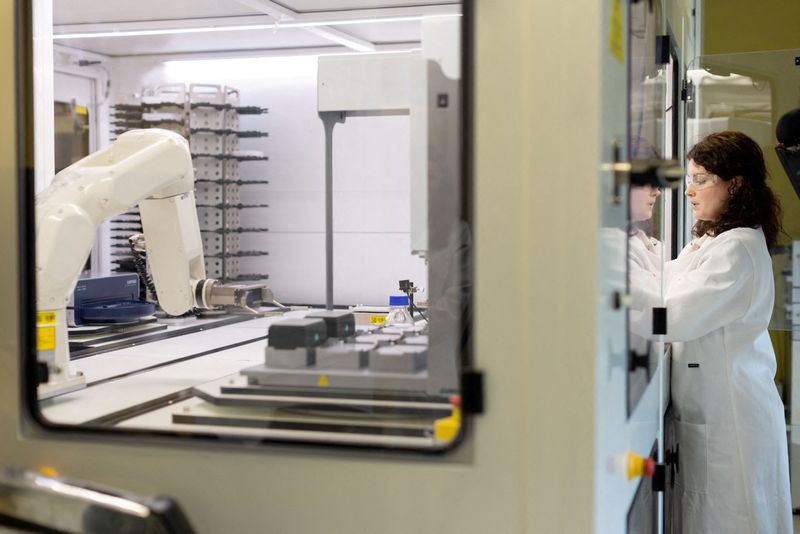By Maggie Fick
STEVENAGE, England (Reuters) - GSK's chief scientist says an overhaul of the drugmaker's R&D unit has begun delivering results - citing an RSV vaccine and promising hepatitis B and asthma treatments - and pledged a tighter focus than his predecessor on infectious disease and HIV.
Tony Wood only took the helm of R&D last August. But in an interview with Reuters he said he had worked closely since 2018 with his predecessor Hal Barron to drive a culture shift that Chief Executive Emma Walmsley had said was needed to improve performance after her appointment in 2017.
Wood highlighted two changes they pushed through in the department's operations: scientists are now encouraged to terminate research projects months earlier if they are failing, and decision-making has been simplified on issues like development plans for drugs in late-stage trials, to minimize delays.
He also said that investments under Barron, such as a research partnership with the University of California using CRISPR gene-editing technology, had sharpened GSK's focus on using genetic evidence in drug discovery. He cited the company's own research findings that medicines with so-called "genetic validation" are nearly two times as likely to go from clinical trials to market than those without it.
Today, he said, some 70% of the drugs in the company's development pipeline are "genetically validated", compared with 20% in 2017 before the R&D overhaul began.
In a major departure from his predecessor, however, Wood said he is de-emphasizing R&D in oncology.
"Hal talked a lot about oncology. I’ll talk less about it," he said, specifying that the R&D focus is now firmly on infectious disease and HIV.
The company sold its marketed cancer drugs to Novartis in 2015 and under Barron's leadership of R&D, sought to rebuild an oncology business, in part through deals like the $5.1 billion purchase in 2019 of U.S. biopharma firm Tesaro.
GSK has since suffered a series of clinical trial setbacks in its cancer drugs portfolio, most recently last year involving ovarian cancer drug Zejula and blood cancer drug Blenrep. In the case of Zejula, GSK said it would limit use of the drug as a second treatment option in consultation with the U.S. Food and Drug Administration (FDA), and in line with data on the broader class of therapies that indicated the drugs could have a detrimental effect on survival rates in such patients.
The foray into oncology contributed to negative comparisons by the market to British peer AstraZeneca (NASDAQ:AZN), which has built up a strong oncology portfolio.
Barron, who left GSK to lead U.S. biotech start-up Altos Labs but took a seat on GSK's board, declined an interview request for this story.
Wood said the R&D team had narrowed its work in oncology to developing treatments for people with advanced states of cancer who are unresponsive to other treatments. He cited ongoing trials for alternate uses for its PD-1 inhibitor drug Jemperli, which is currently approved in the United States and Europe for use on certain types of endometrial cancer.
BLOCKBUSTER POTENTIAL
Analysts say that despite a string of strong quarterly earnings, lingering concerns over the company's drug pipeline reflect in GSK's share price. It has fallen 20% since January 2020, compared with Astra's stellar 42% rally, and in the so-called price-to-earnings ratio for the stock, which fell from around 14 last June to below 10 - just over half the level of AstraZeneca.
One investor, whose health care-focused fund holds shares in AstraZeneca but not in GSK, said the seemingly less-coherent approach of GSK's R&D in recent years was a leading reason why the market sees AstraZeneca as a more promising bet.
“AstraZeneca has momentum, so does Eli Lilly (NYSE:LLY), Novo Nordisk (NYSE:NVO) ... it’s the long-term growth stories with exciting pipelines that drive top-line growth, margin expansion and long-term returns," said the investor. The investor said he does not see enough GSK drugs, either on the market or in development, with potential to be a so-called "blockbusters" with annual sales exceeding $1 billion. "Hopefully they can achieve that through successful investment in the pipeline over time."
But Wood said the overhauled R&D department has put GSK in a strong position to meet growth targets.
That is crucial as GSK faces a combination of patent expiries and declining revenues for its current bestsellers by the end of this decade. Among the affected products are the Shingrix vaccine and treatments containing HIV product dolutegravir, which last year made up a combined 9 billion pounds ($10.94 billion) in sales, a third of the company’s total.
GSK hopes its respiratory syncytial virus (RSV) vaccine could be its next blockbuster, forecasting 3 billion pounds in future peak sales; Credit Suisse analysts forecast 2.5 billion pounds. U.S. regulatory approval on GSK's vaccine, and a rival vaccine developed by Pfizer (NYSE:PFE), is expected in May.
Wood said other potential bestsellers in late-stage development are hepatitis B treatment bepirovirsen and severe asthma treatment depemokimab, with the company forecasting both could be major growth drivers by the end of the decade.
UBS analyst Michael Leuchten said Wood's claims about improvements in the R&D unit thanks to better use of human genetics to identify drug targets, and the use of AI/ML tools, were hard to evaluate. "There are other companies doing this and the road to fruition is long, whereas the replacement need in the pipeline is meaningful and maybe more immediate."
($1 = 0.8414 pounds)
